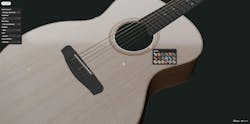Dowina is an acoustic guitar manufacturer based in Bratislava, Slovakia. In a market brimming with boutique suppliers and numerous well-known brands, a key aspect of Dowina’s market approach is the customizability of its products. While this facet of Dowina’s business marks a key strategy to help them stand out in a crowded marketplace, the demand for product customization is a fast-growing requirement for manufacturers in nearly every industry vertical.
For Dowina, product customizability includes the choice of tonewoods, such as cedar or spruce, for the top of the guitar as well as materials for the guitar’s back and sides, such as cocobolo or Indian rosewood. This choice of woods affects the guitar's look and, more importantly, its sound. Dowina’s customers can also customize other design aspects such as the rosette (which surrounds an acoustic guitar’s soundhole), head shape (where the tuners are located) and the neck of the guitar.
According to Dowina, there are 45 quadrillion possible combinations available to its customers, making the guitar manufacturer one of the world's most adaptable custom guitar producers.
This level of customizability introduces several challenges for the manufacturer, including the management of internal processes, pricing calculations and intricate customer interactions.
Augmented reality configurator
To boost its customizability strategy and streamline associated work processes, Dowina began using Vectary’s no-code 3D and augmented reality (AR) platform to create a product configurator that also optimizes backend workflows, reduces production time and minimizes production errors and client miscommunications.
Michal Koor, CEO and founder of Vectary, explained that Dowina’s use of Vectary’s platform as a product configurator is “just one of the use cases that can be created with the Vectary platform. The company focuses more on the creation of digital twins, which involve connection to internal data for monitoring and control of a real-world product in real time. An example would be an interactive 3D model of an industrial product consisting of many other parts like screws and gears. A configurator [built on our platform] would serve as a tool to identify specific parts with exact parameters and connect them with the internal database, in-stock information and a direct link to order more parts as needed. Having this ability is a tremendous help not only for the customer, but also as an internal tool for OEMs.”
Other companies using Vectary’s platform include Sharp, Kimberly-Clark Professional and Milwaukee Tool.
Users of Vectary’s platform don’t need to implement its broad scale capabilities to gain operational benefits. Deploying the technology as a standalone configurator, as Dowina has done thus far, with interactive and animated elements, can significantly improve the effectiveness of company processes, said Koor.
“Firstly, it can be used during the product development process to better communicate CAD engineers' ideas and speed up communication between departments because everything is shared online via links without the need to download and send big CAD files or generate static renders that don’t hold all the information,” said Koor. “Secondly, the configurator is a powerful sales tool for customers to select from various material and shape options, understand how the product works and preview the product in its real size using AR. Using AR in the product development process can save a significant amount of resources in the conceptual phase, because it allows you to test the product virtually, at actual size and in different locations, which can reduce the need for samples and travel expenses.”
Beyond Dowina’s use of Vectary’s technology as an online configurator, the platform also helped the company experience a successful NAMM (National Association of Music Merchants) trade show when several of its guitars were broken during transport to the event.
At the NAMM show, Dowina spotlighted its 3D configurator built on the Vectary platform, which enabled them to showcase digital twins of customized instruments to enhance the customer experience on the show floor with diverse personalization options.
“Despite the ultimate bad luck of losing and breaking the guitars during transport, we were able to bear it because of the Vectary configurator,” said Dowina’s CEO Erika Mat'o Marinová. “We used it to showcase the guitars to potential partners, and it garnered a lot of attention, especially from our competitors. Everyone agreed that this is exactly how the future of custom shop guitar building should look.”
With the aid of Vectary’s technology, Dowina plans to produce an increasing number of customized guitars and transition from standard production operations to a custom shop model.
“Vectary aligns perfectly with this concept, offering added value and involving clients in the process amid an overload of standard products in the market,” said Marinová.
File sharing and future plans
Koor noted that Vectary’s AR files can be shared through email or chat communications to improve the customer experience and help reduce returns, “as customers can try the virtual product on-site before placing an order.”
A key aspect of using Vectary’s platform as a customer facing product configurator is based on its ability to use a manufacturer’s existing CAD files across a variety of platforms.
“Vectary turns CAD files into mesh, which is a more lightweight and faster way to work in an online environment. It also protects the original file from replicability when shared publicly online,” said Koor.
Explaining how the Vectary platform can tie into production applications such as design for manufacturability, Koor said the technology can be used to “create specs for manufacturers and explain how the product works with relevant information about variations and modular parts. AR can also save resources typically spent on creating physical samples, especially if the manufacturer is located far from the engineering and design teams.”
With Dowina’s massive number of possible configurations, Koor said the company’s biggest obstacle was managing the vast product customization options and associated communications between clients and manufacturer.
“Dowina lacked an internal solution and database for their 3D models, which made pricing and updates difficult to manage,” he said. “They had been using Excel for this, but to solve their operational issues, they implemented a product configurator using Vectary’s platform that not only shows the visual outcome for the production team but also provides an accurate price estimate.”
Marinová said, “Vectary’s integration into Dowina’s workflow enabled our team to swiftly master 3D configurators. The rapid onboarding and intuitive design of Vectary's technology empowered our team to create intricate configurators and textures quickly and easily.
She added that Dowina plans to “further develop the availability of exports from Vectary and integrate them into our production system.”




